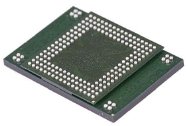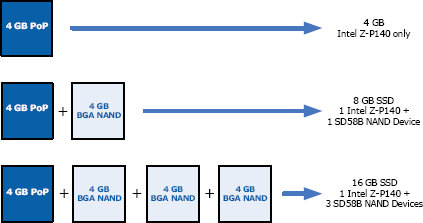Penny-sized flash drive holds 16GB
Dec 17, 2007 — by LinuxDevices Staff — from the LinuxDevices Archive — 3 views Intel has announced a flash memory companion module for its forthcoming “Menlow” chipset for Linux-based mobile Internet devices (MIDs). The Z-P140 SSD (solid-state drive) measures 0.7 x 0.5 x 0.07 inches (18 x 12 x 1.8mm), and will be available in capacities up to 16GB.
Intel has announced a flash memory companion module for its forthcoming “Menlow” chipset for Linux-based mobile Internet devices (MIDs). The Z-P140 SSD (solid-state drive) measures 0.7 x 0.5 x 0.07 inches (18 x 12 x 1.8mm), and will be available in capacities up to 16GB.
(Click for larger view of the Z-P140 SSD)
digg this story |
Intel describes its new SSD as “smaller than a penny, and weighing less than a drop of water.” The part is “400 times smaller in volume than a 1.8-inch hard drive,” Intel boasts, “and at 0.6 grams, 75 times lighter.”

Intel Z-P140 SSD
The Z-P140 comprises a small 12mm x 12mm dual-channel PATA (IDE) controller module powered by a 32-bit RISC processor, and connected to the host board via a standard 40-pin interface. The physical connector is a 168 BGA (ball grid array).
Atop the PATA module, between one and four NAND flash modules can be stacked via a 122 BGA package-on-package (PoP) interface. Each PATA channel supports up to two modules. Currently supported NAND modules include Intel's SD54B 2 GB and SD58B 4 GB NAND modules.

Intel Z-P140 package-on-package (PoP) configurations with SD58B 4GB NAND modules
The Z-P140 parts have a standard PATA interface, and thus could serve as a drop-in replacement for IDE hard drives in most any computer system. However, the parts will be marketed initially at least for use with Intel's “Menlow” chipset for MIDs (mobile Internet devices).

Concept Menlow-based chat device
(Source: Intel)
Additional claimed characteristics for the Z-P140 SSD include:
- Read speeds of 40 Megabytes-per-second (MB/s)
- Write speeds of 30 MB/s
- Active power use 300mW (milliwatts)
- Sleep mode power use 1.1mW
- 2.5 million hours MTBF (mean-time between failures)
Intel calls the SSD an “optional part” of the Menlow platform. The chip giant announced Menlow in Beijing in April, a day after revealing its vision for Linux-powered Linux-based Mobile Internet Devices (MIDs). Menlow includes Intel's “Silverthorne” mobile device processor, based on a 45nm silicon process and “High-K” metal gate transistor technologies, along with the “Poulsbo” companion chip (integrated northbridge/southbridge).
Pete Hazen, director of marketing for Intel's NAND products group, stated, “Our customers are finding the Intel Z-P140 PATA SSD to be the right size, fit, and performance for their pocketable designs.”
Availability
The Z-P140 is currently sampling, with mass production slated for Q1, 2008. The 2GB version will ship first, followed by the 4GB version.
Intel's currently shipping Z-U130 SSD connects via a USB interface. An SSD with a SATA interface will be announced as a product line in 2008, Intel said.
This article was originally published on LinuxDevices.com and has been donated to the open source community by QuinStreet Inc. Please visit LinuxToday.com for up-to-date news and articles about Linux and open source.